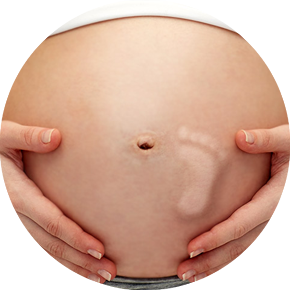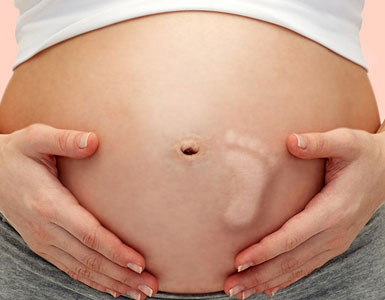Baby movements during pregnancy

Whether you are carrying your first baby or third, every pregnant mommy looks forward to feeling kicks and flutters from her little baby.
A baby's movements, in the womb, are a reassuring sign that he baby is developing and thriving.
Not all movements you feel are actually kicks from your baby. Babies spend plenty of time in exploring the uterus by moving their hands, changing sides, hiccupping and even doing somersaults.
When will I feel my baby's movements?
You might begin to feel your baby moving, often called 'quickening', around the 18th week of your pregnancy. If this is your first pregnancy, there are chances that you will not be able to feel his movements until about 20 weeks.
However, by the second pregnancy, you might notice your baby's movements as early as 16 weeks.
What will my baby's movement feel like?
The type of movements you'll feel will depend on two factors. First, what the baby is doing and second, their stage of growth and development. The first butterflies you feel in your tummy will be like swishing, rolling sensations or a tiny kick. As your pregnancy progresses, the movements will become more frequent and distinctive.
As your baby grows in size and strength, your skin is stretched tighter over your womb, and you will feel the kicks of your baby with ease. Towards the end of the pregnancy, kicks to your ribs might even hurt.
How often should I feel my baby's movements?
Once you feel your baby's movements around 20 to 24 weeks, you'll begin to notice them often. The average baby kicks falls between 15 and 20 a day - this includes all movement. Every baby is different, and this includes their movements too.
Babies rest and sleep in the womb as much as 17 hours in a day, for about 40-50 minutes at a time. If you've been busy, you might not notice your baby's wakeful movements.
Should I track my baby's movement?
Keeping tabs on the movements of your baby is important, but unless you're expecting a high risk pregnancy, there's no need to be consumed about his kick counts.
Instead of tracking your baby's every movement try to study his movement pattern. In case you notice anything highly unusual, seek medical assistance.
Will My Baby Move Less After 36 Weeks?
Your baby should be moving throughout the day. After 36 weeks of pregnancy, babies have less room for big movements like kicks and rolls. However, this doesn't mean you should feel a reduction in movement – they will still use their hands to explore the uterus, play with the umbilical cord, and try to stretch in the cramped environment.
What should I do if my baby stops moving?
If you haven't felt any movement from your baby by 24 weeks, see your gynecologist.
If your baby's movements decrease or stop, it probably means that there's a problem. Your OB/GYN will check on your baby's heart rate and movements. If necessary, he will send you to the hospital for monitoring or treatment.

